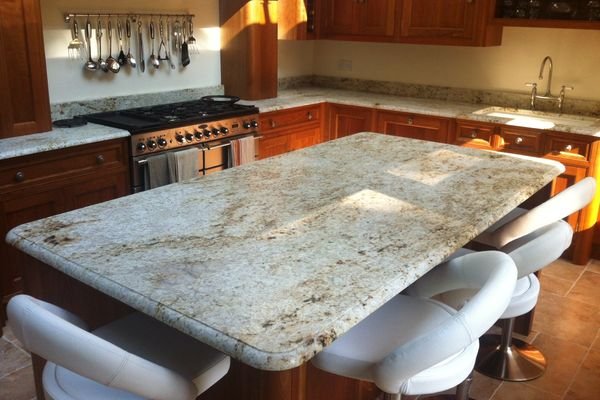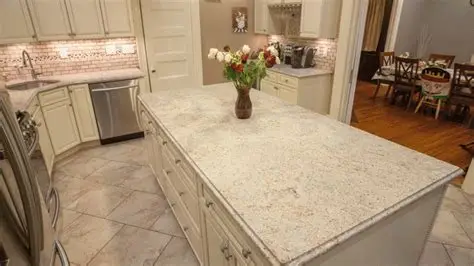
Granite is one of the most popular natural stones used in kitchens and bathrooms around the world.
Granite is one of the most popular natural stones used in kitchens and bathrooms around the world. Its durability, stunning visual appeal, and overall resilience make it a go-to choice for homeowners and interior designers alike. But when it comes to performance and maintenance, one question often arises: Is granite non-porous? In this detailed guide, we’ll explore this question from a geological and practical perspective, touching on related topics like sealing, staining, and proper maintenance.

Understanding Granite: A Natural Marvel
Granite Geology and Composition
Granite is an igneous rock that forms deep within the Earth’s crust. It primarily consists of quartz, feldspar, and mica, giving it a coarse-grained texture. These minerals vary in concentration, affecting the granite’s color and strength. As a granite stone, it is revered for both beauty and resilience.
Read more: What is the hardness of granite?
Characteristics of Granite
- Extremely durable and long-lasting
- Heat-resistant surface
- Visually versatile (available in white granite countertop, black granite countertops, and more)
- Adds value to your home

Is Granite Porous or Non-Porous?
What Does Porous Mean?
Porosity refers to the presence of tiny holes or pores within a material that allow liquids or gases to pass through. Non-porous materials do not absorb moisture, making them more resistant to stains and bacteria.
Granite’s Natural Porosity
Granite is a porous material by nature, although it is considered less porous compared to other stones like marble or limestone. The level of porosity varies depending on the specific slab and its mineral composition. However, granite is not non-porous unless it has been professionally sealed.
Further reading: Is granite porous?
Sealing Granite: Turning Porous Into Practically Non-Porous
Why Sealing Granite Is Crucial
To reduce porosity and enhance resistance to staining, granite countertops should be sealed regularly. A proper sealant fills the microscopic pores, making the surface functionally non-porous.
How Often Should You Seal Granite?
- Light-use kitchens: every 2–3 years
- High-traffic kitchens: annually
- Test method: Pour a few drops of water on the countertop. If it darkens after 5–10 minutes, it’s time to reseal.
Does Granite Stain?
Yes, granite can stain if it is left unsealed or the sealant wears off. Common culprits include red wine, oils, and acidic substances. Sealing helps mitigate this issue significantly.
For more insight, read: Does granite stain?
How to Remove Stains from Granite
- Use a poultice paste for deep-set stains
- Mild dish soap and warm water for daily cleaning
- Avoid harsh chemicals or bleach
Natural vs. Engineered Granite
Natural Granite
This is 100% quarried stone with variations in color and texture. It requires sealing and proper maintenance.
Engineered Granite
Also known as granite composite, this material blends crushed granite stone with resin. It tends to be less porous and often comes pre-sealed.
Aesthetic & Functional Pairings
Granite Backsplash Designs
Granite backsplashes offer seamless aesthetics and easy maintenance. Choose complementary or contrasting granite slabs for visual harmony.
Pairing Granite with Cabinet Colors
Neutral tones like white, gray, or espresso pair well with black granite countertops. Earthy or ivory cabinets complement white granite countertops beautifully.
Want inspiration? Check out:
- What Color Backsplash Goes with Black and Brown Granite Countertops? (3)
- What Color Backsplash Goes with Black and Brown Granite Countertops? (4)
Granite Maintenance: Best Practices
Cleaning Granite Countertops
- Use pH-neutral cleaners
- Avoid vinegar or citrus-based products
- Soft cloth and warm water for regular wipes
Sealing Granite
Reinforce granite’s stain resistance by sealing it with a high-quality impregnating sealer.
Repairing Chips and Scratches
Use granite repair kits to fix minor chips. For major issues, consider professional services.
Polishing Granite Surfaces
Granite polish enhances shine and luster. Avoid over-polishing which can create buildup.
Aardwolf Granite Solutions
Aardwolf Granite Countertop Collection
Whether you’re after affordable granite countertop options or premium slabs, Aardwolf offers a wide range of designs to suit any aesthetic.
Services Include:
- Granite installation services
- Custom fabrications
- Sealing and care consultation
Explore more:
Why Choose Aardwolf?
- Competitive granite countertop cost
- Wholesale granite suppliers
- Aardwolf granite pricing guide
- Best Aardwolf granite colors for modern and classic interiors
Conclusion: Is Granite Non-Porous?
Technically, granite is not non-porous, but with proper sealing, it becomes highly resistant to staining and liquid absorption. Whether you’re choosing a white granite countertop for elegance or a black granite countertop for a bold look, maintenance is key. Sealing transforms granite from naturally porous to functionally non-porous, making it an ideal choice for kitchens, bathrooms, and beyond.
Recommended Reads:

